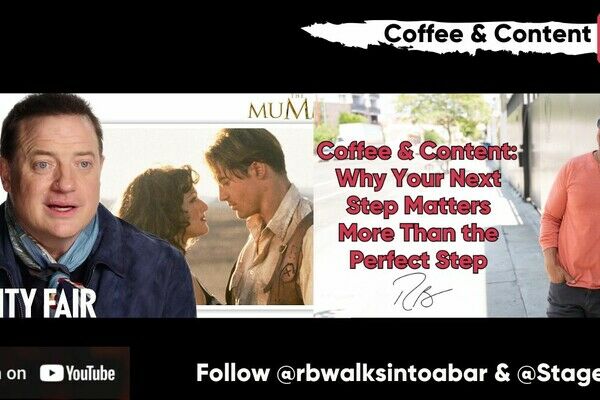Part II: A Stage 32 Exclusive: Agency Business Yesterday and Today
 Richard "RB" Botto
Richard "RB" Botto
As time has passed, friends in the network and studio business have told me that the day I retired, the heart and soul of William Morris retired with me.
Sam Haskell

Mary Kirkpatrick Haskell
I encourage all Stage 32 members to leave Sam a question in the Comments section below. Sam has agreed to choose 5 questions that he will personally answer, and reward those 5 Stage 32 members with an autographed copy of his book, Promises I Made My Mother.
In addition, Sam has generously offered the proceeds from the sales of his book through Stage 32 to the Mary Kirkpatrick Haskell Scholarship Foundation.
A more decent and generous soul you cannot find. I thank Sam for giving us this gift.
Enjoy.
RB
My encounters with three actresses at different times in my career demonstrates how my mother's advice-to give what others need in order to get what you need-works, no matter what the era.
I'd always fantasized about meeting the stars. When I was ten, I shelved books at the Amory Public Library and took every opportunity to read each book, magazine, or newspaper I could find to learn about Hollywood. We had material on all of the top Hollywood stars: Clark Gable, Loretta Young, James Stewart, Elizabeth Taylor, Grace Kelly, Judy Garland, Vivien Leigh, Katharine Hepburn, Humphrey Bogart, and Bette Davis, and I read them all.
Bette Davis, in particular, fascinated me. Somehow, she didn't seem like a typical movie star. She was more handsome than beautiful, and she seemed so grounded. I just loved her. My fascination never faded, even as I grew older. I was dying to meet her someday.
In the spring of 1982, after I'd been an agent for two years, I was responsible for covering every single talk show and variety show on television; if there was a spot into which I could book a William Morris client, it was my job to find it. I got hundreds of William Morris clients on the air, and I was excited to go to the office every day.
I also worked with the producers and packagers we represented, to help them put together their network television projects. Sir David Frost (and his partners) had come up with a two-hour special called The American Movie Awards. We sold it to Brandon Tartikoff at NBC as an alternative to ABC's yearly Academy Awards telecast.
Deborah Miller assigned me to the new David Frost special, and I was thrilled to be a part of its creation.
At the first production meeting Sir David announced that producer Hal Wallis would get the first American Movie Awards Lifetime Achievement Award. Wallis had produced so many movies I can't list them all here. But they included Anne of the Thousand Days, Barefoot in the Park, The Man Who Came to Dinner, The Maltese Falcon, and Casablanca.
Mr. Frost said he wanted Bette Davis to present the award. She and Wallis had done several movies together, including Jezebel, for which Miss Davis had won her second Best Actress Oscar, in 1938.
"Who knows Bette Davis?" he asked, explaining that someone had to call and ask if she'd appear.
The room, full of producers, writers, and network executives, remained silent.
"All right, does anyone know Marion Rosenberg, Bette Davis's agent?"
I didn't know Marion, but I raised my hand and said, "I'll call her." Mr. Frost said, "Thank you, Sam, but Marion will probably make you call Bette yourself. She's... tough. Do you think you're up for the job?"
I'd barely replied, "Yes sir," when the older men in the room started telling me horror stories about Bette Davis, suggesting that I should reconsider having volunteered. I didn't care what they thought of her, I was determined to talk to Bette Davis.
Sir David told me to call the next morning and then report back to him.
At 9 A.M. sharp I called Marion Rosenberg. As predicted, she told me I'd have to call Miss Davis directly. She warned me that there would be many questions and that the way I answered those questions would determine the outcome.
When I got through to Miss Davis's assistant, Kathryn Sermak, she put me on hold. It seemed like I waited a half hour, but it was probably only five minutes. While on hold, I prayed that God would help me find the right words. My prayer was interrupted by a voice I knew all too well. "Mr. Haskell, this is Bette Davis ....What exactly would you have me do, and how does this involve Mr. Hal Wallis?"
I explained-it probably sounded like a rehearsed speech, but it came straight from my heart-why we were honoring Hal Wallis, and why she was the best-qualified person to give him the Lifetime Achievement Award.
"What exactly are The American Movie Awards?" she asked.
I explained the idea behind Sir David's show.
She laughed and said, "David will have his hands full with the Academy over this one!" That led into a fifteen-minute discussion about who I was, my age, where my accent came from, how long I had been an agent, etc. I must have answered all of the questions correctly, because Miss Davis agreed to do the show.
I thanked her. No, I gushed; I admit it. I was about to hang up when she said, "Mr. Haskell, there is one condition. I want you standing on the red carpet when I arrive, you'll walk me into the theater, and stay in the Green Room with me until it's time for me to present Mr. Wallis his award."
She didn't have to ask me twice. To get what she said she wanted-"the company of this funny young agent with the heavy Southern accent, who was both earnest and eager" (I guess I was somehow different from other people who had made business calls to her)-she ultimately gave me what I wanted as well: her presence at the awards ceremony.
Naturally, David Frost was overjoyed, and he told everyone at NBC and William Morris how "the kid called Bette Davis and convinced her to be on the show."
Roger Moore hosted the show, and my client, Debbie Allen, along with the cast of the TV show Fame danced down Hollywood Boulevard, then burst into the theater to complete their production number. Dudley Moore, Debbie Reynolds, Jane Fonda, Liza Minnelli, and Ginger Rogers were all there as well. David Frost was thrilled. It was a great moment for me. I'd proven myself to my clients, and somehow made Ms. Davis happy to help me.
A month later I got an invitation to Bette Davis's seventy-fourth birthday party. The party started at 7 P.M. at Miss Davis's penthouse apartment on Havenhurst Drive in Hollywood. I arrived at 6:45, and I drove around the block until 6:55. Then I parked, rode the elevator up, and rang the doorbell. Miss Davis answered the door herself. "Well, Mr. Haskell," she said, "how perfectly prompt you are."
She asked me in, and then called to her assistant Kathryn and said, "That will be ten dollars!" Playing off my quizzical look, she explained, "I bet Kathryn ten dollars that YOU would be the first to arrive."
Miss Davis took me on a tour of her beautifully appointed apartment. Everyone else arrived "fashionably late," which meant that I had the hostess all to myself for half an hour. In her living room, Miss Davis showed me a portrait of herself that hung over the mantel. It had been fashioned after her character Margo Channing in the Academy Award-winning film, All About Eve. "Now that's the way I want to be remembered," she said.
She also showed me both of her Oscars, displayed prominently in her den, and we discussed her disappointment at not being cast to play Scarlett 0'Hara in Gone with the Wind. I couldn't believe she was telling these things to me. It was incredible.
When Mary and I married the following December, Miss Davis sent us a congratulatory note, and I realized yet again how wrong my father and others had been to think I had thrown my life away by coming to Hollywood. I was so happy-both to be making good impressions and to be befriending the Hollywood stars of my childhood fantasies.
The second of these three women made me laugh when I met her, and she still makes me laugh today. Debbie Allen, my second client (Kathie Lee Gifford was my first), has always been a great soul mate. I'd wanted to represent Debbie Allen from the moment I was hired at William Morris. She'd had a role in the movie Fame and was cast in the TV version that went on the air in January 1982 on NBC. Her William Morris agents worked in our New York office. I told them that she was going to need a television agent on the Coast.
"Let me help you," I said. "Let me be your West Coast contact." They agreed because of the way I asked. I'd learned that offering to help by saying, "Let me help you" instead of "Let me do this" was a nonthreatening way of opening the door to let myself in. I was confident enough that once I got in the door, I'd stay inside the room.
Debbie and I finally met during the taping of The NBC Family Christmas, in December 1981, when the producer, Bob Precht, summoned me. "We've got a problem with Debbie Allen," he said. "She won't sign her contract."
Debbie had probably been a little bit of a diva to one of the production assistants, refusing to come out of her dressing room to do her big number with the cast of Fame. Precht dispatched me to her dressing room, I knocked, and she said to come in.
"Ms. Allen, I'm Sam Haskell."
"And?"
"I'm one of your agents at William Morris."
"Oh, you are? Well, look at this contract! This says I work for scale. I don't work for scale. I just got a Tony nomination for playing Anita in West Side Story! I just starred in Ragtime! I'm starring in Fame! That's why I'm here!"
"Ms. Allen, I know," I said. "You are one of the most important clients we have, and I am honored just to be in your presence. What can I do to make this better?"
She got a big smile on her face. "Baby, if you can go tell Mr. Precht, Mr. Ed Sullivan's son-in-law, that I love my Bob Mackie dress, and get him to agree to give it to me, I'll sign the contract."
"I'll be right back," I told her.
I ran back to Bob Precht. "Here's how to solve this nightmare," I said. "I know you paid ten thousand dollars for this Bob Mackie dress. You own it. But who else besides Debbie Allen will ever wear it? Give it to Debbie Allen and we can get her to sign the contract."
He said, "Give her the damn dress."
I ran back: "Ms. Allen, you can keep the dress."
"I'll sign the contract," she said, "and I want you in my life." We've been friends and business partners ever since!
The third actress, Kirstie Alley, was a client for many years. She's very smart, beautiful, and a little eccentric. She has also battled her weight for a long time.
A few years ago, I went to a Pier I commercial shoot with her when she was at her largest. She knew the truth, but couldn't face the fact that she'd become so large. One of the Pas had to lace her up in a corset, under her gown, like Mammy lacing Scarlett in Gone with the Wind.
After the shoot I had to have one of these "come to Jesus" meetings with her because she had complained to me, "Why can't I get the lead in all of the movies and TV series that I'm interested in? Why can't I be the love interest?"
I looked at her, at her beautiful face, and knew I just had to be honest. "Because you're seventy-five pounds overweight," I said. "You've become a character actress right before our eyes. You are so pretty, but in Hollywood, pretty is thin. You can get supporting parts as a heavy woman, but not roles like the once trim and gorgeous Kirstie Alley everyone knew."
Something clicked in her eyes then. She knew that I loved her, and at that moment, though it wasn't easy, she decided to face the fact that she no longer liked who she was. She needed a way to figure out how to like herself again, to conquer the constant struggle with her weight. How could she turn this weakness to her advantage?
That's how the Showtime series Fat Actress was born. I set my client Brenda Hampton (7th Heaven) to write and produce it. I even convinced NBC's Jeff Zucker to guest-star in the first episode. I knew Kirstie was unhappy and needed to work, and I needed to make her happy to help herself. So we decided that she should wear her own experience in public. I told her, "Lots of viewers will identify with you. And then if you want to lose weight, we'll go to Slim-Fast, or we'll go to Jenny Craig, and we'll make a deal where you'll be paid to lose weight."
Kirstie wanted to feel better about herself. She felt losing weight was the answer. I wanted her to be happy in her own skin, and in turn, as her agent, to have a client who knew what direction we were going in and why. The series Fat Actress gave her a"playing ground" to deal with her weight issues, and the deal with Jenny Craig paid her to lose the weight. She dropped seventy pounds, and the next thing I knew she was on Oprah in a bikini!
We both got what we wanted, and everyone was happy!
"Nearly all men can stand adversity, but if you really want to test a man's character,give him power."
- ABRAHAM LINCOLN
The year 1997 was an outstanding one for me. Everything good happened. Every deal closed. Lily Tomlin hosted a dinner at which I was honored by the Alliance for Children's Rights as their Man of the Year. The L.A. Mission honored me with their "Men Helping Women" award. I was the de-facto Worldwide Head of Television and on the fast track to becoming president of the William Morris Agency. My then-seven-year-old daughter, Mary Lane, was chosen to be on the pilot of Bill Cosby's version of the show Kids Say the Darndest Things for CBS.
In June, the week of my forty-second birthday People magazine ran a big article about the kids we'd helped go to college through the Mary Kirkpatrick Haskell Scholarship Foundation and our biannual "Stars Over Mississippi" concerts. The People writer, who had followed me around for two months, at one point asked me to name the most important thing that had happened to me in Hollywood. Of what was I the most proud? I'm sure she expected to hear about Bill Cosby's latest deal, or something I helped make happen for George Clooney, Debbie Allen, or Kathie Lee Gifford.
"I guess what I'm most proud of," I said, thinking of how I'd determined to be one person for everyone so I could be comfortable anywhere and avoid personal artifice, "is that I'm exactly the same guy today that I was when I arrived here in 1978."
I think that surprised her. Sure, experience had made me savvier and more polished, but inside I felt exactly the same: I had the same values, same morals, same core. Even if I now bought my suits at Barneys instead of Belk, I was still essentially the same person as when I'd left Mississippi almost twenty years earlier.
The writer then asked for the names of some of my really important friends for comments. I gave her Leslie Moonves, president of CBS; Warren Littlefield, president of NBC; Phil Hartman, Bill Cosby, and George Clooney. Any of them would have given her a good quote.
To my surprise, she talked to the parking attendant in the William Morris garage instead, who said, "Mr. Haskell always tells us 'Good morning' and 'Good night,' and he's one of the few who brings us something at Christmastime. He's always the same."
After I retired from William Morris in 2004, a secretary who was stationed on the path to my office when I walked in every morning, wrote and told me it meant a lot to her that I always greeted her as I passed her desk. To her, I was one of the most important men in the company. To me, she was just a human being like the rest of us, who deserved common courtesy. "Thank you," she wrote. "Your saying hello to me always made me feel good about myself."
Both of those comments, from people I saw on a daily basis, brought a smile to my face. They told me that I'd kept the promise I'd made to my mother about living my life "standing in the light." She never tolerated anything less from me. And, of course, my wife wouldn't have put up with less for a Mississippi minute.
Sam is generously donating proceeds from Stage 32 members sales of his memoir, Promises I Made My Mother, to the Mary Kirkpatrick Haskell Scholarship Foundation.
To purchase Sam's book click here: Promises I Made My Mother.
| Part III: A Stage 32 Exclusive: Our Year of Living Famously |
| A Stage 32 Exclusive: Agency Business Yesterday and Today |
Search Stage 32 Blog
There are now 4033 blog posts for you to enjoy. Search them all by tags below.
Acting, Advice, Cinematography, Coffee & Content, Composing, Contests, Distribution, Featured, Filmmaking, Financing, Inspirational, Networking, Producing, Screenwriting, Success Stories, Tips, Trending,Relevant Tags
Recommended Articles

Coffee & Content: Opening Doors & Taking Control of Your Creative Path

Don't Let the Momentum of November Write Club Die: How to Stay Active Into 2026 & Beyond!

Green Lights and Grey Areas: Expanding Creative Collaboration in Publishing

4 Reasons To Have Audio Description On Your Film

Happy Thanksgiving From Stage 32: We Are Thankful For YOU

How Modern Franchises Became Our New Religion

Coffee & Content: Why Your Next Step Matters More Than the Perfect Step

Stage 32 + DramaBox Join Forces to Launch World's First Vertical Drama Incubator

Stage 32 Now Certifying Centro de Portugal Film Commission!




